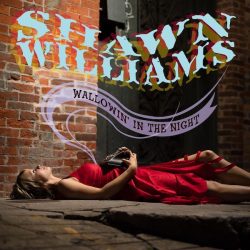Gutsy but uneven bar-room Americana.
 There is a lot to like about this fourth album by New Orleans songwriter Shawn Williams. In its stronger moments, it brings to mind the raw and direct music of Lucinda Williams or Gina Villalobos. Shawn Williams has a similar husky drawl, with a lot of personality and tone. Her band provide a muscular, tight and appropriate setting for her songs, bringing to mind Counting Crows and Sheryl Crow: the guitars crunch and chime, the bass pushes and the organ sings. These songs would sound great coming out of a thumping PA.
There is a lot to like about this fourth album by New Orleans songwriter Shawn Williams. In its stronger moments, it brings to mind the raw and direct music of Lucinda Williams or Gina Villalobos. Shawn Williams has a similar husky drawl, with a lot of personality and tone. Her band provide a muscular, tight and appropriate setting for her songs, bringing to mind Counting Crows and Sheryl Crow: the guitars crunch and chime, the bass pushes and the organ sings. These songs would sound great coming out of a thumping PA.
Opener ‘Someone Else’ is well-chosen – representing all the best qualities of Williams’ music. Second track ‘Buzzed’ really showcases the band – a tight bluesy groove over which the players each get to solo. The Rhodes solo, with its nods to the Doors’ ‘Riders on the Storm’, is a standout moment. If there’s a single on the album it’s probably ‘If You’re Gonna Leave’ – a memorable and heartfelt chorus that Tom Petty might have been happy singing.
Williams’ press pack plays up and celebrates the apparent eclecticism of her music – she apparently “makes music that’s every bit as diverse and hauntingly soulful as her hometown”. It is true that the album includes some stylistic changes – the fourth track ‘Everything You Stood For’ is quite a departure from the preceding three, switching from country-rock to 90s indie (Radiohead’s ‘Creep’ came to mind). ‘So Tired’ slips into Iggy Pop ‘Passenger’ territory. Both are quite a contrast from the plaintive country of ‘Don’t Go’.
An eclectic set can work well if the quality is consistent: shifting moods and different arrangements can help keep a listener’s interest, but ultimately the songs matter. The album would probably have been stronger with a bit of pruning, and with a little more melodic ambition; Williams tends to sing within a fairly narrow range and using a limited set of vocal moves (e.g. sliding up to a note on the last syllable of a line). This makes each song feel less distinctive and the album rather too samey overall. As is often the case, less would probably have been more.


